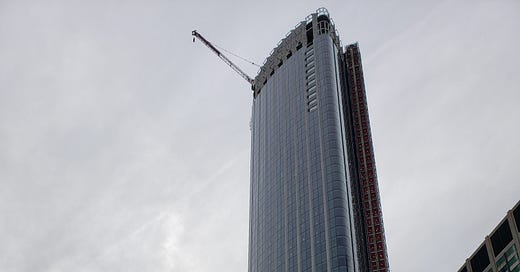Mainstream media’s love affair with anti-Israel campus extremists | With push to meet clean energy goals sputtering, state convenes high-powered panel | Boston’s mayor’s hotly-contested tax plan would also shield wealthy homeowners | Wu courts controversy with South Boston fundraiser |
News tips? Story ideas? Email us at sbvanvoorhis@hotmail.com
The unspoken part: Boston Mayor Michelle Wu’s controversial tax plan would shield more than just struggling seniors from rising costs
The shift to remote work has pummeled the value of office towers, long a cash cow for city coffers.
Now Boston’s mayor is scrambling to head off a huge increase to the tax bills of city homeowners as a potential $1.5 billion revenue gap looms.
How? Wu wants to stick owners of struggling downtown buildings and businesses with the bill by hiking commercial tax rates.
But the mayor’s argument that she is fighting to protect seniors and other homeowners of more limited means doesn’t tell the full story.
That’s because multimillion-dollar home and condo owners in Boston would be some of the biggest beneficiaries of Wu’s proposal to spare residential taxpayers from the brunt of the city’s financial woes.
That’s the conclusion of an analysis of city tax numbers by Daniel Swift, a principal in the Boston office of the global tax consulting firm Ryan LLC and a leading foe of the mayor’s tax plan.
Owners of condos and homes across Boston worth $1 million and up would be spared $42 million in increased taxes. Under Wu’s plan, the tax load would instead be shoved onto the firms that own office buildings and other commercial properties in the city, and the businesses that lease space in them, according to the report, which was reviewed by Contrarian Boston.
For condo and mansion owners with properties worth $5 million, Wu’s plan will mean savings of more than $8 million in taxes they would have otherwise had to pay, but for the mayor’s proposed commercial tax rate hike.
As for owners of condos and homes less than $1 million? They would escape what would otherwise be an additional $28 million increase to their taxes.
“It’s the highest value properties that will see the largest benefit from her policy,” Swift told Contrarian Boston. “The majority of benefits will go to the entire residential class (of taxpayers), regardless of need.”
Contrarian Boston reached out to the mayor’s press office for comment but did not receive a response by our deadline.
Still, while Wu’s plan is arguably bad economics, it is probably good politics.
Wu swept into office in 2020 on the wings of an uber progressive message and lopsided majorities in the pricier precincts of the Back Bay, Beacon Hill and South End.
She’s now gearing up for a likely reelection campaign next year - with a big fundraiser Wednesday night in South Boston, per our story below - though she has not officially announced yet.
And the last time we checked, there’s no shortage of multimillion condos and homes - and potential Wu voters - in any of those neighborhoods.
Skewed focus? Boston Globe showers more attention amplifying the concerns of a small group of anti-Israel campus activists
Like other mainstream media outlets, the Globe has devoted far too much reporting resources exploring the gripes and views of fringe campus activists.
The latest example? An extensive exploration by the Globe’s Hilary Burns of complaints by anti-Israel activists about the behavior of Harvard administrators, who apparently have been big meanies.
Keep reading with a 7-day free trial
Subscribe to Contrarian Boston to keep reading this post and get 7 days of free access to the full post archives.





